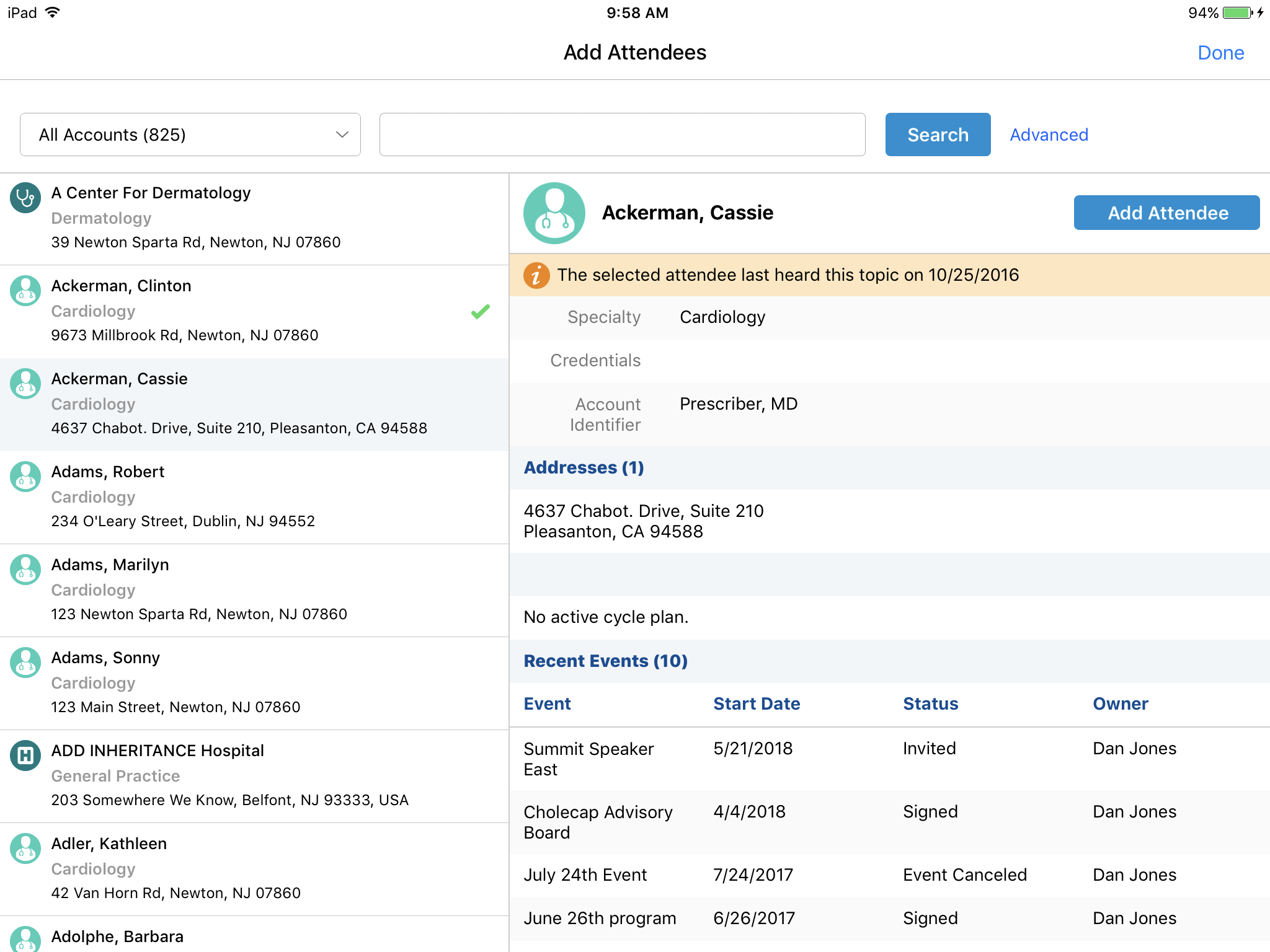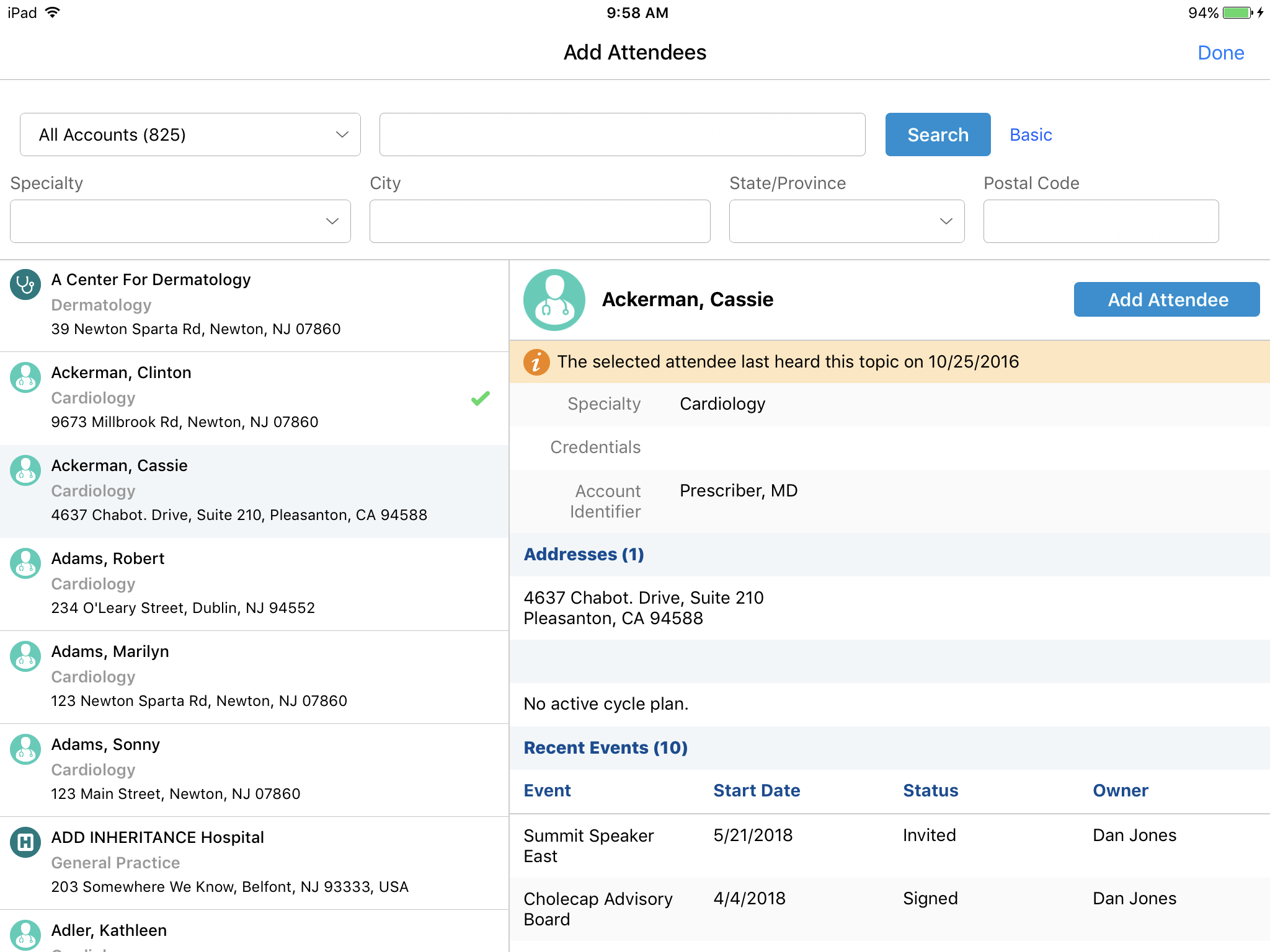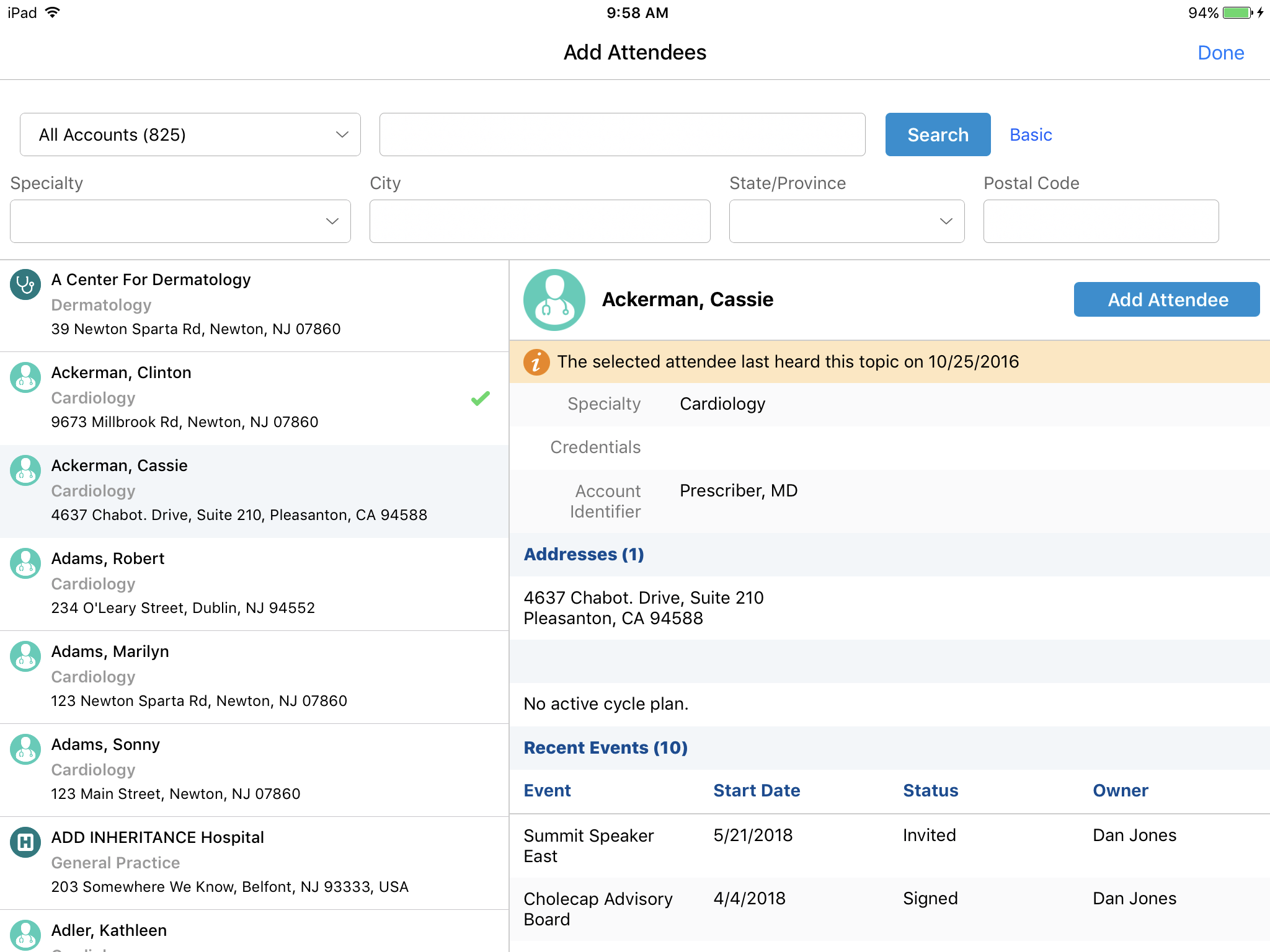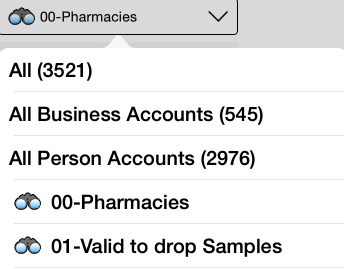Adding Attendees to an Event
- Browser
- iPad
To improve efficiency and provide more ways to maintain attendees, a new Manage Attendees page includes functionality for the following:
- Detailed Attendee information
- Advanced Attendee Search
- Outside Territory Attendee search

Configuration
- Enter a value of 1 for the Advanced_Attendee_Management_vod Veeva setting.
- Add the Manage_Attendees_vod button to the Visible Buttons on the EM_Event_Layout_vod object.
- Add the Manage_Attendees_vod button to the page layout on the Medical_Event_vod object.
- Add the Attendee related list to the appropriate page layout. This determines which fields display after selecting Manage Attendees.
- Enable the EM_Attendee_Hub_vod Visualforce page.
- Enable the EM_Add_Attendee_vod Visualforce page.
- Ensure users have the appropriate permissions for the Visualforce pages.
On iPad, the columns that display on the Attendee Hub depend on connectivity:
- Connected - Columns that display on the Attendee Hub are controlled by the columns on the Attendee related list on the Event object
- Disconnected - Columns that display on the Attendee Hub are determined by the Event Attendee related list on the Medical Event object
Fields that display are also based on the user profile FLS settings. If the page layout does not contain the Attendee Related list, no data displays on the new Manage Attendee page.
Use
Users can change the grid size and sorting order to view Attendee information. Users can also filter the Attendee list based on attendee type or status.
Detailed Attendee Information
With the new Attendee Search page, users are able to view detailed attendee information to determine valid attendees before inviting them to an Event. For example, if you only want to invite attendees whose specialty is Oncology, you can view that in the attendee information section. Administrators determine which fields to display via the Event Rule and the Attendee_Fields_vod record type.

Configuration
To configure which fields display for the Attendee details panel:
-
Grant end users FLS edit permission to the following fields on the EM_Event_vod and Medical_Event_vod objects:
- Account_Attendee_Fields_vod
- User_Attendee_Fields_vod
- Contact_Attendee_Fields_vod
-
Grant end users FLS read permission and admins edit permission to the following fields on the EM_Event_Rule_vod object:
- Account_Attendee_Fields_vod
- User_Attendee_Fields_vod
- Contact_Attendee_Fields_vod
- Navigate to the Event Configuration tab.
- Create an Event Rule with Attendee_Fields_vod record type.
- Set the value for the Account_Attendee_Fields_vod field to Account Attendee.
- Set the value for the User_Attendee_Fields_vod field to User Attendee.
- Set the value for the Contact_Attendee_Fields_vod field to Contact Attendee.
- Enable the EM_Attendee_Hub_vod Visualforce page.
The format for multiple values is ;;Field Name;;Field Name;;
The following special keywords are supported:
- Address – Displays all active addresses. Supported for the following field types:
- Account_Attendee_Fields
- User_Attendee_Fields
- Contact_Attendee_Fields
- LastTopic – Displays a warning if the attendee was invited to an event for the same topic in the past. Supported for the following field types:
- Account_Attendee_Fields
- Contact_Attendee_Fields
- RecentEvents – Displays the 10 most recent events the attendee was invited to, including upcoming events. Users must have visibility to the events to view in the list. Supported for the following field types:
- Account_Attendee_Fields
- User_Attendee_Fields
- Contact_Attendee_Fields
- MCCP – Displays all team-goals for event attendance, along with progress toward those goals. Supported for the following field types:
- Account_Attendee_Fields
To support LastTopic, grant end users FLS permission to the Topic_vod field on the EM_Event_vod and Medical_Event_vod objects.
Use
Users can launch the new Attendee Search page from the Attendee Hub page by selecting Add Attendee, and the Attendee Related list by selecting the plus sign + (iPad) or New Attendee (Browser). The Advanced_Attendee_Management Veeva Setting must have a value of 1.
Configurable Topic Warnings and Rollups
To assist users in selecting attendees and speakers, the Attendee and Speaker pages contains two tables with information to help in the decision making process: Topic Warning and Recent Events.
Customers can now configure which status values are used in the calculation for Topic Warnings and Attendee and Speaker Rollups. The Topic Warning only uses the configured statuses to determine if the user should be warned.
The Attendee and Speaker Rollups use the configured statuses to account for attendance related calculations. For example, an Attendee should only be considered as an attendee if their status is Attended but not Invited.
The Attendee Recent Events section now includes the Attendee Status to clearly identify the attendance status for the HCP. Furthermore, if an Event is Canceled, the attendee’s status displays as Event Canceled.
Configuration
-
Set the status values for attendees who count toward topic warning and attendance-based roll up summaries on the Event record.
- Open the ATTENDEE_ROLLUP_STATUS_FILTER_vod setting. By default, the Veeva Message referenced by this setting is ATTENDEE_ROLLUP_STATUS_FILTER_vod;;EVENT_MANAGEMENT. An alternate message can be used to allow different settings by user profile.
-
Open the referenced Veeva Message and enter a comma-delimited list of Attendee statuses. The Attended and Signed statuses are included in the default Veeva Message.
The Attendee Topic Warning displays for past events if the Event_Status_vod is listed in the ATTENDEE_ROLLUP_STATUS_FILTER_vod setting and is not set to canceled. (If the ATTENDEE_ROLLUP_STATUS_FILTER_vod setting is blank, the warning displays for attendees with the Attended_vod and Signed_vod statuses.
The warning also displays for future events if the Status_field on the Event_Attendee_vod object is not set to rejected and the Event_Status_vod field on the Event_Layout_vod object is not set to canceled.
-
Set the status values for Event Speakers who count toward year-to-date utilization on the Speaker record and attendance-based rollup summaries on the Event record.
- Open the SPEAKER_ROLLUP_STATUS_FILTER_vod setting. By default, the Veeva Message referenced by this setting is SPEAKER_ROLLUP_STATUS_FILTER;;EVENT_MANAGEMENT. An alternate message can be used to allow different settings by user profile.
- Open the referenced Veeva Message and enter a comma-delimited list of Event Speaker statuses.
If the SPEAKER_ROLLUP_STATUS_FILTER_vod Veeva Setting does not contain a value, only Event Speakers with a status of Attended_vod or Signed_vod count for the Attendance Summary fields on the EM_Event_vod object and in the calculation for the Year_to_Date_Utilization_vod field on the EM_Speaker_vod object.
- Enable the appropriate VMOCs for the Events_Management_Setting_vod object.
Use
The Recent Events results page displays a Status column. Canceled Events are identified so the user knows the particular HCP did not attend that event.

Status configuration allows users to accurately track actual speaker and attendees attendance based on business requirements. By default, the Attended and Signed statuses are included for Attendees, and all statuses are accepted for Event Speakers. Users can add additional standard or custom statuses to the Veeva Settings.
Advanced Attendee Search
With the new Attendee Detail page, users are able to search the attendees by search terms. For example, if you want to search Dr. Smith in San Francisco, CA, you can search Dr. Smith by the combination of Name, City, and State/Province. Customers can also configure one custom field on the Account, User, and Contact objects to be part of the search interface. For large data sets, it is recommended to index the custom search field, as well as the State_vod and City_vod fields on the Address_vod object.

Japanese orgs can also enable searching for attendees by furigana.
Configuration
The custom search field is configured by entering values in the Account_Attendee_Fields_vod, Contact_Attendee_Fields_vod, and User_Attendee_Fields_vod fields on the Event Rule record used in setting up the Attendee Details panel of the new Attendee Search page. The first field set in each of these values is used as the custom search field.
Only one custom field can be used for each of the Event Rule fields.
For example, if the value on the Account_Attendee_Fields_vod is as follows:
;;Account_Identifier_vod__c;;Address;RecentEvents;
The Account Identifier displays as a search field allowing users to search Accounts by the field.
Updates to this Event Rule are reflected in new EM_Event_vod records created with this rule applied. Updates do not apply to existing EM_Event_vod records.
For the custom search field, Text (up to 255, includes formula), Phone, Email, and Picklist field types are supported. It is possible to use the configured search field when searching within an Account view. To configure this, the configured search field should be a column on the Account view.
Use
Users can search attendees by name, by default, and the configured field, city, state/province, postalcode as the advanced search. You can search the attendees by the combination of the search terms.
Outside Territory Attendee Search
This feature allows users to search for attendees who are outside their territory. Users can search by Name, State/Province, City, and Postalcode. This allows HCPs to suggest other Attendees for an Event who are outside the user’s territory.
Configuration
- Select the Search Outside My Territory check box on the Attendee_Field_vod record type on EM_Event_Rule_vod object.
- Ensure users have FLS permission to the Search_Outside_Territory_vod field on the EM_Event_Rule_vod object.
- Ensure users have FLS edit permission to the Entity_Reference_Id_vod field on the EM_Attendee_vod and Event_Attendee_vod objects.
- Ensure users have FLS permission to the appropriate fields on the Account_vod and Address_vod objects. For example, Name or City, as these are used to search for Attendees. If the user does not have FLS to a particular field, it does not display.
- Enable the VODAccountSearch apex class for the appropriate user profile.
Use
Users need an internet connection to search for attendees outside their territory. If the search has more than 50 results, a warning message displays. Inside territory results display with an orange indicator. Outside territory search results display with a gray indicator. Results display in alphabetical order.
When viewing an attendee outside of the user's territory, the attendee's list of recent events displays all recent events that the account attended, even if the user does not have access to the corresponding event or event attendee record.
Users can add an Attendee by selecting the Add Attendee button. Adding an Account to an Event does not align the account to the user’s territory.
Limiting Outside Territory Searches
When adding attendees or reconciling walk-in attendees, administrators can configure event rules to only search for accounts in the country where the current user is located or the country where the event takes place. This limits outside territory accounts from displaying as potential matches during the invitation or reconciliation processes while also achieving compliance requirements regarding HCP data restrictions across borders.
Search matches are based on the values of the following fields as queried by the event rule:
- The Country_vod field on the EM_Event_vod object
- The standard Country field in the Address section of the User object
- The Country_vod field on the Account object
Potential matches can also be filtered by specifying account record types in the event rule.
For example, Sarah Jones is reconciling walk-in attendees from a Congress event in France. The event rule for Congresses states only accounts of the Professional_vod record type in the same country as the event display as potential matches for an attendee reconciliation search. Sarah searches for matches for a walk-in attendee named Johnny Smith. The event rule displays John Smith, a professional in France as a potential match while John Smith, a pharmacist in France, and John Smith, a professional in the United States, are prevented from displaying.
Configure
To configure this feature:
-
Grant administrators FLS edit permission and end-users FLS read permission to the following fields on the EM_Event_Rule_vod object:
- Search_Outside_Territory_Record_Type_vod
- Search_Outside_Territory_Filter_vod
- Place the fields from step 1 on the appropriate EM_Event_Rule_vod object page layout used by the Attendee_Fields_vod Event Rule Record Type.
Use
To limit results returned by an outside territory search:
- Navigate to the appropriate EM_Event_Rule_vod record.
-
Edit the following fields:
-
Search_Outside_Territory_Record_Type_vod – Multi-select picklist determining which account record types display as results
This picklist only displays record types the user can access.
- Search_Outside_Territory_Filter_vod – Multi-select picklist with the following values:
- Event_Country_vod – When selected, only accounts with the same country as the event display as potential matches
-
User_Country_vod – When selected, only accounts with the same country as the Event Team Member user display as potential matches
If both values are selected, results display from both the user’s country and the Event’s country.
-
These filter fields apply in two locations:
- When conducting an Outside Territory Search to add attendees to an event
- When conducting a walk-in attendee reconciliation search
Account View for Attendee Search
Users can apply an Account View to the Accounts on the attendee search page. This enables users to have a group of accounts. This feature is available for both the new Attendee Search page of the Attendee Hub, and the Manage Attendees page.

Users can see the Account views in the filter box on the attendee search page whether one or multiple Account views are defined.
Avoid naming custom views the same as default filter criteria.
Event Attendee Record Type Mapping
Data captured for attendees during Event planning varies depending on the type of Event. Users can now capture corresponding data in the correct place by mapping Attendee record types with the Event Attendee record type. Only one-to-one mapping is supported. This feature is available for both Events Management and Medical Event users.
Configuration
To enable record type mapping between the EM_Attendee_vod and EM_Event_vod objects (Event_Attendee_vod and Medical_Event_vod objects), populate the DEFAULT_ATTENDEE_RECORD_TYPE_vod Veeva Message with the mapping. For example: Event_Record_Type1,Attendee_Record_Type1;;
Use
When a user adds an attendee either via the new Attendee Search page of the Attendee Hub, or the existing Manage Attendees page, the attendee is created with the record type specified in the setting, depending on the record type of the Event.



